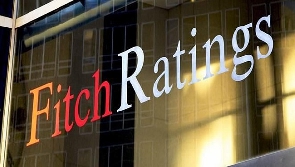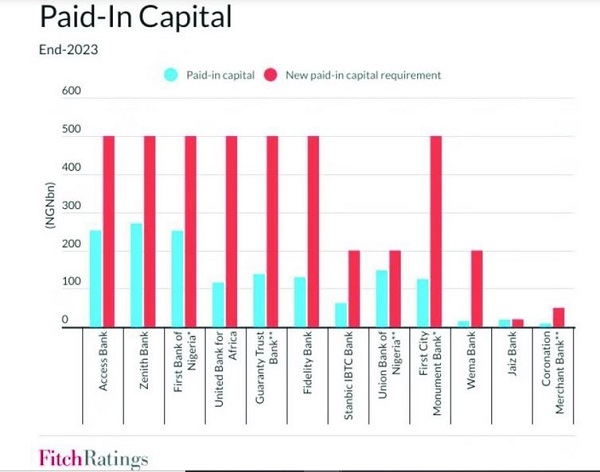 Fitch said Banks will have to meet new requirements through fresh equity capital injections or M&A
Fitch said Banks will have to meet new requirements through fresh equity capital injections or M&A
Nigerian small and medium banks may face difficulty raising much need capital to meet new capital base requirement by the apex bank, according to a global ratings agency, Fitch.
Increased paid-in capital requirements for Nigerian banks will spur equity issuance over the next two years, supporting a recovery in the banking sector’s capitalisation, Fitch Ratings says.
According to the global ratings agency, the sharp devaluation of the Nigerian naira since May 2023 has depressed capital ratios via the inflation of foreign-currency-denominated risk-weighted assets.
The firm noted that some small and medium-sized banks may struggle to raise the necessary capital, leading to increased M&A. This would result in a more concentrated banking sector, with higher barriers to entry, greater economies of scale and stronger long-term profitability.
Fitch said such developments would be unlikely to have significant rating implications, as the Long-Term Issuer Default Ratings (IDRs) of the vast majority of Nigerian banks are constrained by Nigeria’s ‘B-’ creditworthiness position.
The Central Bank of Nigeria (CBN) announced on 28 March that commercial banks, merchant banks and non-interest banks must meet significantly higher paid-in capital requirements (share capital plus share premium) by end-1Q26.

According to analysts, higher requirements have been widely anticipated for several years, particularly since the naira devaluation, but the announced increases are significantly larger than Fitch analysts’ expectations.
Commercial banks with international and national licence authorisation, which account for most of the banking sector, face 10x and 8x their existing requirements, respectively.
No Fitch-rated banks currently meet the new requirements, it said. Several would do so if they could transfer their retained earnings and other equity reserves to paid-in capital.
However, the CBN has prohibited the use of these items to meet the new requirements, in contrast to the other markets that have increased paid-in capital requirements in recent years, such as Egypt and Ghana.
“We do not expect banks to pay out large dividends for shareholders to reinject as paid-in capital, as we doubt the CBN would grant approval, and, in any case, the dividends would be subject to tax”.
Fitch said Banks will therefore have to meet the new requirements through fresh equity capital injections or M&A, or by downgrading their licence authorisation, and they must submit their implementation plans to the CBN by the end of this month.
The combined paid-in capital shortfall for Fitch-rated banks is about N2.6 trillion or USD2.1 billion, according to the report.
“We expect a marked increase in equity issuance over the next two years. Access Holdings and FBN Holdings recently announced plans to raise up to N365 billion and N300 billions of capital, respectively.
“These amounts, if down streamed as paid-in capital, would be sufficient for their banking subsidiaries to meet their new requirement of N500 billion”.
Some other banks have recently raised, or are in the process of raising, large amounts of capital relative to their balance sheets, but not enough to meet the new requirements.
Some small and medium-sized banks may struggle to raise the necessary capital, and could be acquired by larger banks, Fitch Ratings said.
Certain domestic systemically important banks have particularly high capital ratios but are significantly below the new paid-in capital requirements, and may prefer to consider acquisitions over seeking fresh capital injections.
“We do not expect license authorisation downgrades to play a major role in meeting the new requirements as they would necessitate divesting foreign subsidiaries or disentangling regional branch networks”, Fitch said.